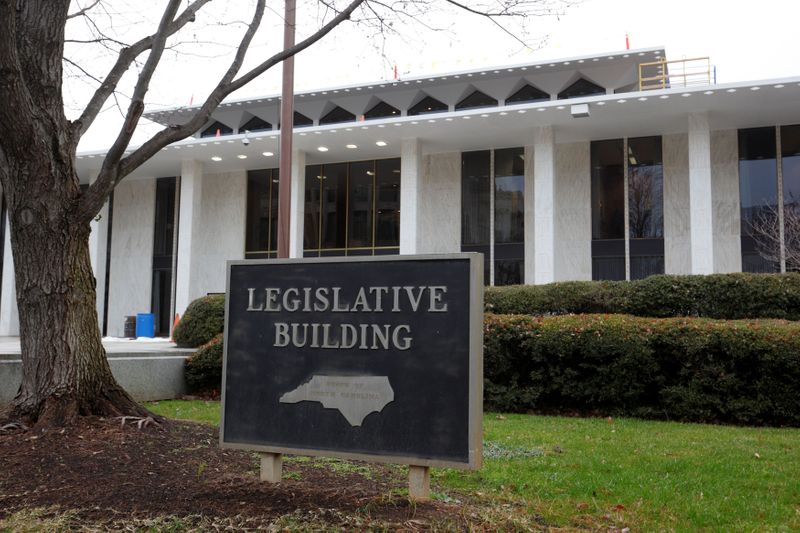By Sharon Bernstein and Peter Szekely
SACRAMENTO, Calif. (Reuters) - Democrats spent $50 million trying to win control of state legislatures in 2020, but the effort mostly failed, cementing regional power in their more conservative Republican opponents over such issues as abortion, education and criminal justice.
The losses also mean that in most of the 29 states with Republican-controlled legislatures, Democrats will not have a say in how Congressional districts are drawn when the once-a-decade process kicks off in 2021. That will make it more difficult for voters in more liberal areas of those states to elect their party's candidates to both the House of Representatives and statehouses for another 10 years.
"There needs to be a reckoning for Democrats, because we are losing these down-ballot races," said a Texas Democratic strategist who requested anonymity in order to speak frankly.
The Democrats' stagnation at the state level came despite massive turnout that flipped at least two states' choices for president from Republican Donald Trump to Democrat Joe Biden, as vote-counting continued in several states before a presidential winner could be declared.
In Texas, party officials plan a post-mortem to determine what went wrong, said the strategist, who is familiar with the thinking of party leaders.
"The Biden brand didn't help us down-ballot," he said.
Biden lost to Trump in Texas, and the legislature stayed firmly in Republican hands despite years of demographic change benefitting Democrats.
TARGETED EIGHT STATEHOUSES
Democrats had targeted eight statehouses across the country. But with the possible exception of Arizona, where ballots were still being counted on Thursday, they failed to make inroads.
In Georgia, where a razor-thin margin separated Biden and Trump, Democrats were poised to pick up a couple of seats but not enough to gain a majority. In North Carolina, Democrats lost a few seats and Republicans held on to their majority.
Dave Abrams, who helped manage the Republicans' state-level efforts, said the mistake Democrats made was having candidates run on national issues, including healthcare, the coronavirus and President Donald Trump.
"The reality is that people vote on local issues, especially at the state level," said Abrams, who is deputy executive director of the Republican State Leadership Committee.
The 2020 elections are unlikely to alter the parties' representational balance in U.S. state houses, where Republicans began with 52% of 7,383 state legislative seats, said Ben Williams (NYSE:WMB), a policy specialist with the National Conference of State Legislatures.
Since the Republican sweep of 2010 when the party picked up 20 legislative chambers, Democrats have taken back control of 17 of them, including some, such as the New Hampshire State House, that have swung back and forth, he said.
A major reason for Democrats' struggle to make inroads is partisan gerrymandering that has cemented Republican majorities in states including Texas and Georgia where demographic change appears to favor Democrats but districts are drawn to favor Republicans, said Eric McGhee, a senior fellow at the Public Policy Institute of California.
He cited Georgia, North Carolina and Wisconsin as states where most districts are drawn so favorably to Republicans it would take a particularly large change in local sentiment or demographics to elect Democrats.
In Texas, he said, districts are generally drawn in a way that favors the incumbent, whether Democrat or Republican, which has the effect of cementing Republican control.
'TRUMP ONLY REPUBLICANS'
Jessica Post, who headed the Democrats' state-level coordinating efforts, said an influx of Trump loyalists at the polls and Republican-drawn district maps in many states made it difficult for the party to gain ground.
"They were really drawn with strategic data to make sure that we could not flip these state legislative chambers," said Post, president of the Democratic Legislative Campaign Committee (DLCC).
While the post-election data is still incomplete, Post also suspects the high turnout sparked by the presidential election brought in a wave of "Trump-only Republicans" whose party-line votes helped Republicans near the bottom of the ballots.
In addition to turnout and favorable district boundaries, many local representatives were re-elected because of the very nature of local politics - voters tend to like and keep their representatives even when they vote for someone of a different party at the presidential level, said political scientist Charles Bullock, a professor at the University of Georgia.
In addition, he said, Republicans in Georgia in 2020 had a better ground game than Democrats, encouraging supporters to go to the polls for local candidates as well as Trump.
"They were out door-knocking and doing the traditional things where the Democrats were hesitant to do so because of the coronavirus," Bullock said.

Republican attacks on Democrats as "socialist" or anti-police may have had an impact on some voters as well, particularly in rural areas, although such messages were probably less effective in urban and suburban neighborhoods, he said.
